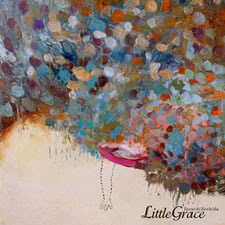
Artist: Yasushi Yoshida
Album: "Little Grace"
Release Date: April 25, 2008
Label: Noble Records
Genre: Neo-Classical, Post-Rock, Instrumental
Mood: Literal, Intimate, Elegant, Sophisticated
Reminds Of: Max Richter, Balmorhea, Tape, Rachel's
What People Think: The Milk Factory Review, ToKafi
Definitely Worth Buying: Dotshop.se
Tracklist
1. Permanent Yesterday
2. Greyed
3. Little Hand
4. Thread Still
5. Lasted In Different View
6. Three Winters Our Trace
7. Under Calf, Winged Steps
8. Lullaby For Rainsongs
Few areas of the world have been as exciting to watch as the experimental community in Japan over the past half a decade. What was originally dominated by noise and psychedelia-oriented music has slowly transformed into a sea of post-rock, ambient, and electronic artists, exposing a magnitude of creative musicians with large ambitions and a wealth of talent at their disposal. While this is undoubtedly a counter-culture movement amongst the very pop focused Japanese mainstream, it is having a much larger and significant impact on the global scale.
Although many have celebrated the evolution of ambient music within the boundaries of Japan, which has broken through a decade-old stagnation of the generation with a more humanistic approach to the whole process, it has really been the electronic circuit which has received the most critical acclaim and will probably leave a lasting impression decades to come. The innovation comes in the natural blending of unnatural pairs of genres, particularly the classical and glitch IDM influenced genres. The two most noteworthy pioneers of the field are undoubtedly found in Katsuhiko Maeda (a.k.a. World's End Girlfriend) and Kashiwa Daisuke, both label mates of Yasushi Yoshida.
Maeda is the eldest of the group, with a discography that now spans almost a decade and a career that demonstrates strong sonic development through time. His work is the strongly influenced by the avant-garde, and, in general, his compositions represent sketches or snapshots of a sonic landscape that is constantly evolving and largely chaotic in nature. Daisuke's approach is much more narrative in nature, as he takes a longer form to allow the pieces to fully illustrate his themes and paints a full portrait for the listener. While both pull from very similar worlds for influence, they achieve stunningly different results, although comparisons between their work is surely evident.
Yasushi Yoshida's debut, Secret Garden, was very much in line with this world. Little Grace, his newly released sophomore effort, is as well, but it'd be difficult to draw such a conclusion without knowledge of Secret Garden and seeing the progression in action. On the surface, much of Little Grace sounds like it's in comfortable proximity to the works of contemporaries Olafur Arnalds, Peter Broderick, and maybe even Balmorhea (and, let's be honest, they all love Rachel's). It has all the required ingredients -- piano, strings, a slow, emotional air -- and the pieces are composed in the general neo-classical style that has now become standard. However, tracks like "Greyed," "Under Calf, Winged Steps," and "Untitled" should tip us off that there's much more going on below the surface than just pretty neo-classical music (not that there's anything wrong with that...), harking back to the works of his Maeda and Daisuke in true cutting-edge style.
Indeed, on closer inspection, even the seemingly straightforward classical pieces are less predictable than Yoshida's peers. The lengthier pieces ("Thread Still" and "Three Winters Our Grace") are accomplished tracks that stretch the imagination and offer a few extra tricks during the expanded time frame. Meanwhile, the shorter tracks ("Permanent Yesterday" and "Lullaby for Rainsongs") adhere closely to stock neo-classical formulas and provide a solid foundation/anchor for the album to flourish from. Essentially, Yoshida provides a spectrum of tracks that highlight the movement of his music from the experimental to the conservative, but in doing so he also doesn't give up the things that made him love the combination thereof in the first place. Although the electronic component is drastically reduced in Little Grace, it is still present and, for the most part, used subtlely. This is brought to the fore in the more experimental tracks, but then fades back into supporting role (if any at all) during the rest of the album.
There's no denying that Yoshida has created a timeless, exhilarating album that many will quickly fall in love with. But, for several reasons, I'm unable to give this album my full support. First of all, I feel that Yoshida is, at times, trying too hard to distance himself from Daisuke and Maeda, and in the process sacrifices the electronic component which is largely what gives his work a voice and separates it from his Western peers. There are many moments on the album that slide into generic neo-classical territory, which is not something you typically see on many Japanese releases. Secondly, his newfound style hasn't quite been developed as fully as his older work, which had the benefit of appealing to the work of his influences. A little more tinkering would flush out the Yoshida sound to great lengths. Lastly, upon analysis of the album and the progress of Yoshida's work, I can't help but conclude that this is a transitional album and his next will be a more satisfying release. Little Grace looks to be wedged between his past work and a more organic work that awaits in the future; we've yet to see his masterpiece, but we're still getting a pretty good view in the meantime.
(source: thesilentballet.com)
“The human capacity to suspend disbelief and get caught up and live through such travails…”




















